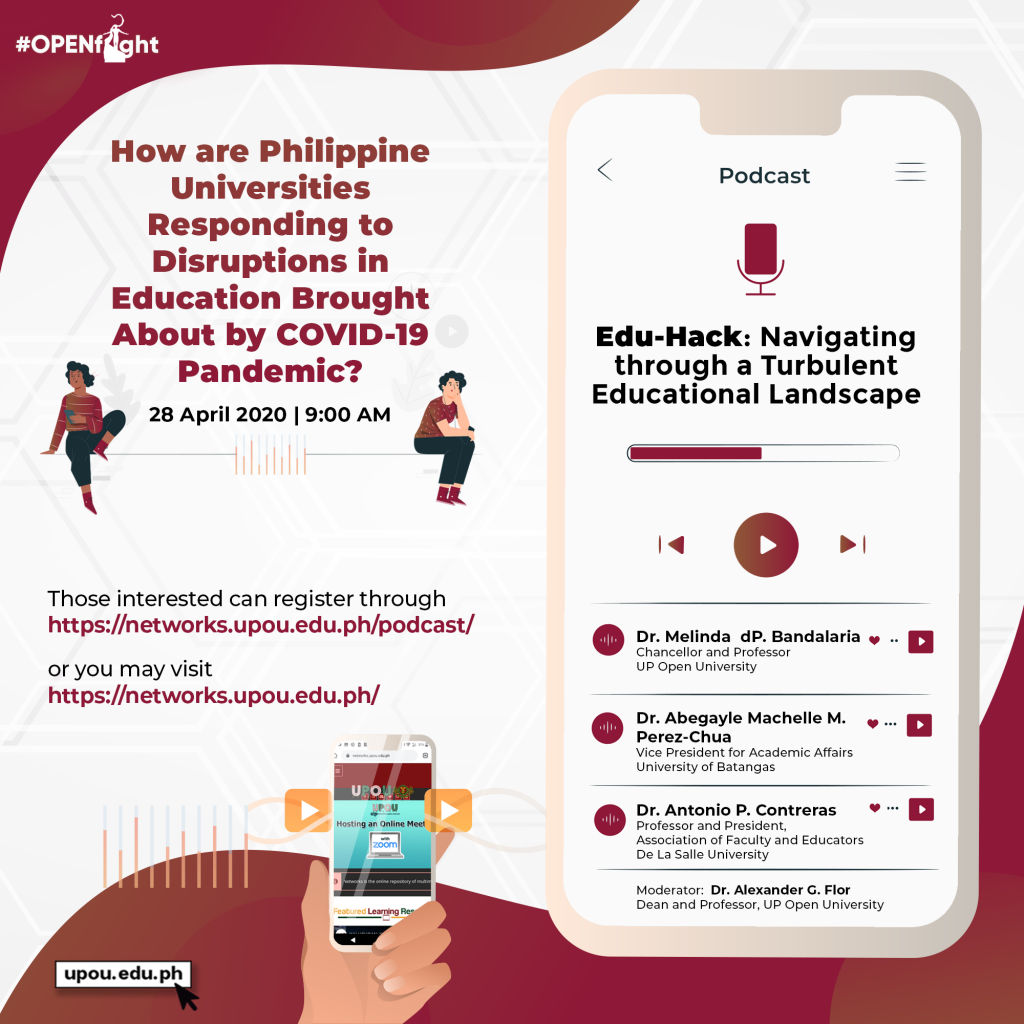
The sixty-minute online panel interview held on 28 April 2020 was a short and sweet success for the University of the Philippines Open University (UPOU). Dr. Alexander Flor, Dean of the UPOU Faculty of Information and Communication Studies (FICS), effectively moderated the first series of the UPOU “Edu-Hack: Navigating through a Turbulent Educational Landscape” entitled “How are Philippine Universities Responding to Disruptions in Education Brought About by COVID-19 Pandemic?”
The panel members for this session were Dr. Melinda dela Pena Bandalaria, UPOU Professor and Chancellor; Dr. Abegayle Machelle M. Perez-Chua, University of Batangas (UB) Vice President for Academic Affairs; and Dr. Antonio P. Contreras, De La Salle University (DLSU) Professor and President of the Association of Faculty and Educators of DLSU.
Dr. Flor posed questions about how their universities fared and coped with the lockdown brought about by the COVID-19 global health crisis.
Dr. Contreras shared that DLSU has started exploring learner-focused and outcomes-based online education since 2004. They have since instituted a policy on online learning, which is done via the Learning Management System, Canvass. He added that although they are prepared for online learning, they had not anticipated that the lockdown would last so long. He shared that DLSU engaged in a consultative and participatory process where the university officials and academic heads met weekly to refine their response ensuring flexibility, fluidity and empowering capacity to innovate. Dr. Contreras shared that DLSU is working on opening their school year fully online this July 2020. Spaces will be provided for courses that require physical presence, discounts on tuition will be given, and internet support will be provided for those in need. For Dr. Contreras, the pandemic is not a time to be rigid, and compassion is needed. Providing student assistance is important so the university should understand and respond to the needs of the students.
Dr. Chua, on the other hand, stated that no university was ever prepared for the lockdown that happened. But at UB, they realized early that technology will help so they started incorporating online technology through blended learning about 5 years ago. As a medical doctor, she knows that the lockdown will not be short so the university is now anticipating that the students cannot be back at the university until September 2020. Dr. Chua shared that UB saw an increase in the utilization of its online platform so the university continues to encourage its teachers to shift to online learning. She added that UB is continually adjusting to the needs of the students. “Those who cannot join online, something is waiting for them when they return.” According to her, no university is perfect amidst the string of changes brought about by the pandemic, but universities are getting better at responding to it everyday.
Dr. Bandalaria shared that UPOU started online learning in 2001 and shifted fully online in 2007. Since UPOU is online, it was thought that UPOU will not be affected by the lockdown, however, UPOU students, especially those who are frontliners, are not able to study. She shared that UPOU also received communication from students who took advantage of the lockdown to catch up with their requirements and revise their thesis. Dr. Bandalaria explained that UPOU addressed their students’ needs by extending the deadlines instead of suspending classes, and making sure that the faculties-in-charge practice extra compassion and flexibility in consideration of the adjustments that students go through in this pandemic. Dr. Bandalaria said that UPOU’s action was based on a framework anchored on flexibility and compassion. UPOU revised its academic calendar, continued with online learning, and adopted and adjusted the guidelines used by the UP System. She said that a change in perspective of the university is needed. Teachers have a bigger role as the “architect” of learning, and online learning provides flexibility because learning should not stop. She ended with the hashtag, #ParaSaBayan.
Due to time constraint, only a couple of questions were entertained from the online viewers which Dr. Flor and the panel members answered. Dr. Flor ended the first Edu-Hack podcast with a poem by Kitty O’Meara entitled “In the Time of Pandemic.”
The session was live streamed via the UPOU Networks and the UPOU Youtube page with 336 registered participants and 430 live viewers on both channels.








